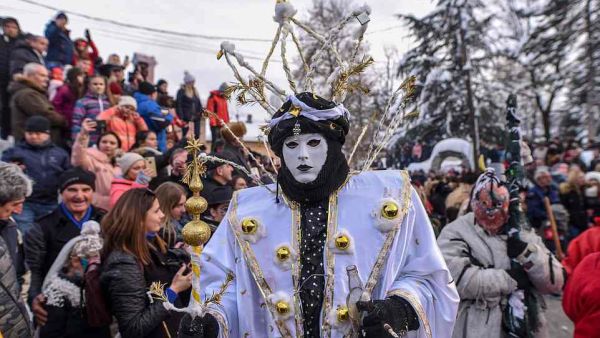North Macedonia held its traditional Vevcani Carnival on Wednesday despite coronavirus measures.
Every year, the village of Vevcani marks Orthodox St. Vasilij Day -- the beginning of the old Julian calendar -- with a 1,400-year-old carnival rooted in pre-Christian traditions.
Performers revel in the streets wearing masks that reflect pagan rituals, religious issues or political satires of current events.
Costumed revellers take part in a carnival in the North Macedonian village of Vevcani.
— AFP News Agency (@AFP) January 14, 2020
The Vevcani carnival is 1,400 years old and is held every year on the eve of the feast of Saint Basil (January 14) - the beginning of the New Year in the Julian calendar
? Robert Atanasovski pic.twitter.com/juP51BrAvw
This year's carnival was canceled because of COVID-19 restrictions, according to the municipality.
Despite warnings by officials, hundreds gathered in the traditional location, Upper and Lower District, where masks of the carnival were displayed.
Police warned attendees to "disperse" but defiant revelers clashed with authorities.
Organizer Vasilicarsko Associati said earlier that the carnival would go on although it is currently forbidden to gather more than four people outdoors.
The Vevcani Carnival celebrates the arrival of the New Year according to the old calendar, a blend between the pagan and modern manner of celebration.
It is based on specific characteristics and separates itself from the rest of world carnivals because of its archaicity, tradition, secrecy and unique masks.
Swastikas, zombies and skeletons: Villagers dress up in bizarre costumes for ancient Macedonian #festival marking beginning of their #NewYear
— Hans Solo (@thandojo) January 14, 2019
Thousands of revellers from across the world flock to #Macedonia to celebrate 1,400-year-old Vevcani Carnival pic.twitter.com/2jWabgOAIS
The carnival has become a major tourist attraction, in part because it merges old pagan rituals with Christian motifs.
This article has been adapted from its original source.








